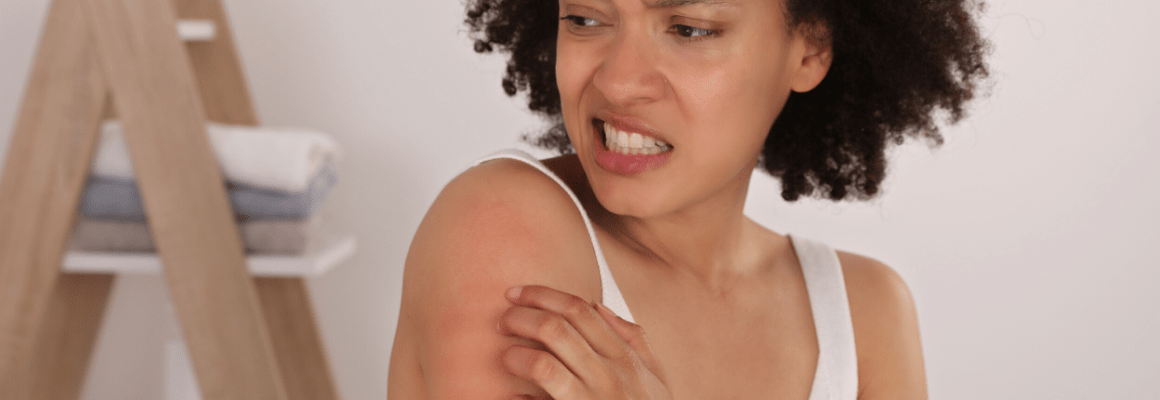As a parent or caregiver, it’s very difficult to watch your child suffering from itchy, red eczema. Even after multiple trips to the doctor and countless creams and ointments, you may feel powerless to stop their pain. With plenty of sleepless nights and constantly begging them not to scratch, it can be a frustrating experience. We hope this post provides some encouragement, support, and hope. Read on for our best treatments for children with eczema.
Please keep in mind that although what we discuss in this post can relieve eczema, we are in no way medical professionals. If you’re experiencing severe eczema symptoms like an infection, it is best to seek medical advice immediately.
Understanding Eczema in Children
You may be wondering how or why your child developed eczema. The truth is, there is no exact answer. Researchers suspect that the condition develops as a result of genetic and environmental factors. Children whose families have a history of atopic dermatitis, asthma, or hay fever are more at risk for developing eczema. This is known as the atopic triad. Common environmental triggers include pollen, animal fur, dust, extreme temperatures, certain fabrics such as wool and polyester, and even some foods.
Remember that eczema is not contagious and is not a result of poor hygiene.
When Does Eczema Usually Appear?
It’s common for eczema to develop during childhood, within the first 6 months to 5 years of life. The most common types of eczema in children are atopic dermatitis, contact dermatitis, dyshidrotic eczema, and seborrheic dermatitis (also known as cradle cap). As a child grows, the location and appearance of eczema also changes. This makes it important to know and understand what the condition looks like through the different stages:
Infants (first 6 months): At this stage, eczema typically appears as red patches with small bumps on the cheeks, chin, forehead, and scalp. The skin will look red and ‘weepy’. Drooling can exacerbate symptoms of eczema on the face.
Babies (6-12 months): As a baby begins to crawl, they may develop eczema on the elbows and knees. These areas are also easier for a baby to scratch.
Toddlers (2-5 years): At this age, eczema is likely to appear in creases of elbows and knees, as well as on ankles, wrists, and hands. You may notice your toddler’s skin is starting to look dry, scaly, or even thicker. This is known as lichenification.
Children (5+ years): At this stage, eczema may appear in folds of elbows and knees, as well as behind the ears, or on the feet or scalp. It’s also possible that it may only affect a child’s hands.
Often time, eczema begins to improve by age 5 or 6. It’s possible it may go away completely but very likely, symptoms will come and go in different cycles.
Natural Children’s Eczema Treatment
While there is no cure for eczema, there are fortunately ways to manage flare-ups and make your child's life more comfortable. Because your child's skin is sensitive, we're strong advocates of natural treatments like eczema cream that don't use harsh chemicals or toxins.
Nourish + Hydrate Manuka Balm
This gentle, non-sticky balm is made with only carefully chosen, natural ingredients, safe and soothing for even the most sensitive baby skin. Each ingredient, from UMF®-certified Manuka honey to nourishing sunflower and camellia seed oils, was thoughtfully selected for its ability to calm irritation and support healing. Originally created by a mom determined to find relief for her own child’s eczema, this balm continues to bring comfort to little ones today. And yes, kids still love its light, naturally sweet honey scent!
Scratch Mitten Sleeves
Protect your baby's delicate skin from relentless scratching with these stay-closed scratch mittens. For additional relief, consider gentle eczema cream for babies. Made with loose fitting 100% cotton with natural silk mittens, they’re gentle on even the most irritated skin. They’re comfortable to wear during the day while playing or during the night.
If you notice any signs of infections, contact your doctor right away.
References:
https://kidshealth.org/en/parents/eczema-atopic-dermatitis.html
https://nationaleczema.org/eczema/children/
https://acaai.org/allergies/who-has-allergies/children-allergies/eczema



